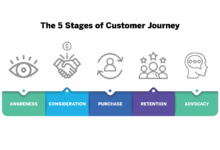CRM With AI Chatbot Integration: Enhancing Customer Relationships
CRM with AI Chatbot Integration revolutionizes customer interactions and data management in businesses, paving the way for enhanced customer satisfaction and streamlined communication processes.
This integration offers a seamless blend of CRM systems and AI chatbots, allowing businesses to personalize customer interactions and efficiently handle inquiries.
Introduction to CRM with AI Chatbot Integration
CRM (Customer Relationship Management) systems are designed to help businesses manage interactions with current and potential customers. On the other hand, AI chatbots are automated tools that can simulate human conversation using artificial intelligence technology. The integration of AI chatbots with CRM systems allows businesses to provide personalized and efficient customer service, streamline communication processes, and gather valuable insights from customer interactions.
Benefits of Integrating AI Chatbots with CRM Systems
- Improved Customer Service: AI chatbots can provide instant responses to customer queries and offer 24/7 support, enhancing customer satisfaction levels.
- Efficient Communication: Chatbots can handle multiple customer interactions simultaneously, reducing response times and increasing operational efficiency.
- Data Collection and Analysis: AI chatbots can gather valuable data from customer interactions, which can be used to improve products, services, and marketing strategies.
- Cost Savings: By automating repetitive tasks and inquiries, businesses can reduce the need for human agents, leading to cost savings in the long run.
Examples of Industries that Can Benefit from this Integration
- E-commerce: Retailers can use AI chatbots to assist customers with product recommendations, order tracking, and payment processing.
- Healthcare: Hospitals and clinics can utilize chatbots to schedule appointments, provide medical advice, and answer common patient queries.
- Banking and Finance: Financial institutions can deploy chatbots to help customers with account inquiries, loan applications, and fraud detection.
- Travel and Hospitality: Travel agencies and hotels can use AI chatbots to handle booking confirmations, itinerary changes, and travel recommendations.
Understanding CRM Systems
Customer Relationship Management (CRM) systems are software tools used by businesses to manage interactions with current and potential customers. These systems help companies improve relationships with customers, streamline processes, and increase profitability.
Key Features of CRM Systems
- Centralized Database: CRM systems store all customer information in one place, making it easily accessible to all team members.
- Lead Management: Helps in tracking and managing leads throughout the sales pipeline.
- Sales Automation: Automates repetitive tasks, such as sending follow-up emails or creating reports.
- Customer Support: Provides tools for managing customer inquiries and resolving issues efficiently.
- Analytics and Reporting: Offers insights into customer behavior, sales performance, and overall business growth.
How CRM Systems Help in Customer Relationship Management
CRM systems play a crucial role in improving customer relationships by:
- Personalizing Interactions: CRM systems enable businesses to tailor their communications based on customer preferences and past interactions.
- Improving Customer Service: By providing quick access to customer information, businesses can address inquiries and resolve issues promptly.
- Increasing Efficiency: Automation features in CRM systems help streamline processes, saving time and resources.
- Enhancing Sales Performance: With better insights and lead management capabilities, businesses can optimize their sales strategies and improve conversion rates.
Role of AI Chatbots in Customer Service
AI chatbots play a crucial role in modern customer service, offering a range of benefits to both businesses and customers. These chatbots are designed to simulate conversations with human users, providing automated assistance and support. Let’s delve into the functions and impact of AI chatbots in customer service.
Functions of AI Chatbots in Customer Service
AI chatbots in customer service are programmed to perform various functions, including:
- Responding to customer queries in real-time
- Providing personalized recommendations based on user preferences
- Assisting in product selection and purchases
- Scheduling appointments or bookings
- Collecting feedback and data for analysis
Examples of How AI Chatbots Enhance Customer Interactions
AI chatbots enhance customer interactions by:
- Offering 24/7 support, ensuring round-the-clock assistance
- Reducing response times and resolving queries promptly
- Improving customer engagement through personalized interactions
- Streamlining the customer service process for efficiency
Impact of AI Chatbots on Customer Satisfaction
AI chatbots have a positive impact on customer satisfaction by:
- Providing instant responses to customer queries
- Offering consistent and accurate information
- Personalizing interactions based on customer preferences
- Enhancing overall customer experience and loyalty
Importance of Personalization in AI Chatbot Interactions
Personalization is crucial in AI chatbot interactions as it:
- Creates a more engaging and tailored experience for customers
- Increases customer satisfaction and loyalty
- Helps in understanding customer needs and preferences better
Comparison Between Rule-Based and AI-Driven Chatbots in Customer Service
- Rule-Based Chatbots: Follow predefined rules and responses, limited in flexibility
- AI-Driven Chatbots: Utilize machine learning to adapt and learn from interactions, offering more personalized and dynamic responses
Steps to Implementing an AI Chatbot for Customer Support
To implement an AI chatbot for customer support, businesses can follow these steps:
- Define the chatbot’s purpose and objectives
- Select a suitable AI chatbot platform or technology
- Develop and train the chatbot using relevant data and scenarios
- Integrate the chatbot with existing CRM systems or communication channels
- Test and optimize the chatbot for performance and user experience
Ways AI Chatbots Can Handle Complex Customer Queries Effectively
AI chatbots can handle complex customer queries effectively by:
- Utilizing natural language processing to understand user intent
- Accessing a knowledge base for accurate and detailed responses
- Escalating queries to human agents when necessary
- Continuously learning and improving through user interactions
Benefits of Integrating AI Chatbots with CRM
AI chatbots offer numerous advantages when integrated with CRM systems. They revolutionize customer data management, streamline communication processes, and enhance overall efficiency in handling customer inquiries compared to traditional methods. Let’s delve deeper into the benefits of this integration:
Improved Customer Data Management
AI chatbots play a crucial role in enhancing customer data management within CRM systems. By automatically collecting and analyzing customer interactions, chatbots can provide valuable insights into customer preferences, behaviors, and trends. This data can be used to personalize customer experiences, target marketing efforts, and improve overall customer satisfaction.
Streamlined Communication Processes
One of the key benefits of integrating AI chatbots with CRM is the ability to streamline communication processes. Chatbots can provide instant responses to customer inquiries, resolving issues quickly and efficiently. This not only saves time for both customers and businesses but also ensures consistent and accurate information delivery across all channels.
Efficiency in Handling Customer Inquiries
AI chatbots outperform traditional customer service methods in handling customer inquiries due to their 24/7 availability and instant response capabilities. Chatbots can handle a large volume of inquiries simultaneously, providing prompt and accurate assistance to customers. This results in faster query resolution, improved customer satisfaction, and increased retention rates.
Successful Integration Examples
Real-world businesses across various industries have successfully integrated AI chatbots with CRM systems to enhance customer interactions. For instance, banks use chatbots to assist customers with account inquiries and transactions, while e-commerce platforms utilize chatbots for order tracking and customer support. These examples demonstrate the effectiveness of AI chatbots in improving customer service and streamlining business operations.
Impact on Customer Satisfaction and Retention
The integration of AI chatbots with CRM systems has a significant impact on customer satisfaction and retention rates. By providing personalized and timely assistance, chatbots enhance the overall customer experience and build customer loyalty. Customers appreciate the convenience and efficiency of interacting with chatbots, leading to higher satisfaction levels and increased likelihood of repeat business.
Cost Savings Benefits
Implementing AI chatbots in CRM systems can result in substantial cost savings for businesses. Chatbots reduce the need for human customer service agents, lowering operational costs and increasing efficiency. By automating routine tasks and inquiries, businesses can reallocate resources to more strategic initiatives while still delivering exceptional customer service.
Implementation of CRM with AI Chatbot Integration
Integrating an AI chatbot with a CRM system can revolutionize customer service and engagement. Here is a step-by-step guide on how to seamlessly implement this integration:
Step-by-Step Guide on Integrating AI Chatbot with CRM:
- Choose a compatible AI chatbot platform that integrates well with your CRM system.
- Map out the customer journey and identify touchpoints where the AI chatbot can assist.
- Set up the AI chatbot to communicate with the CRM system to access and update customer data.
- Train the AI chatbot to understand customer queries and provide relevant responses based on CRM data.
- Test the integration thoroughly to ensure seamless communication between the AI chatbot and CRM.
Benefits of Integrating AI Chatbots with CRM Systems:
- Enhanced customer service by providing instant responses and personalized interactions.
- Improved customer engagement through proactive communication and targeted messaging.
- Efficient data management by automatically updating customer information in the CRM system.
AI Chatbot Platforms Compatible with CRM Systems:
- Salesforce: Salesforce Einstein AI can be integrated to provide intelligent insights and automate tasks.
- HubSpot: HubSpot’s Conversations tool allows for seamless integration with AI chatbots for improved lead management.
- Zoho: Zoho CRM Plus offers integration with Zia, an AI-powered sales assistant, for intelligent customer interactions.
Successful Examples of CRM with AI Chatbot Integration:
- Bank of America implemented Erica, an AI chatbot, to enhance customer service and streamline banking processes.
- Sephora uses AI chatbots to recommend products and provide personalized beauty tips to customers through its CRM system.
Pre-built AI Chatbot vs. Custom AI Chatbot for CRM Integration:
- Pre-built AI chatbots offer quick deployment and cost-effectiveness, while custom AI chatbots provide tailored solutions for specific business needs.
- The choice between pre-built and custom AI chatbots depends on the complexity of customer interactions and data requirements.
Training and Data Privacy Considerations:
- Training the AI chatbot is essential to ensure accurate responses and seamless integration with the CRM system.
- Data privacy and security must be prioritized to protect customer information and adhere to regulations like GDPR.
Customizing AI Chatbots for CRM Needs
Customizing AI chatbots for CRM requirements is crucial for optimizing customer interactions and streamlining CRM processes. Tailoring AI chatbots to specific CRM needs ensures that the chatbots can effectively handle customer inquiries, provide personalized responses, and seamlessly integrate with the CRM system.
Examples of Tailored Features for CRM-Specific Chatbots
- Integration with CRM database to access customer information in real-time
- Personalization options to address customers by name and offer tailored recommendations
- Automated workflows for lead management, customer follow-ups, and sales processes
- Seamless handoff to human agents for complex queries or escalations
How Customization Improves CRM Processes and Customer Interactions
Customizing AI chatbots for CRM needs leads to more efficient and effective customer interactions. By tailoring chatbot features to align with CRM requirements, businesses can provide personalized and timely support to customers, leading to increased customer satisfaction and loyalty. Additionally, customization enhances CRM processes by automating repetitive tasks, streamlining data management, and improving overall operational efficiency.
Data Security and Privacy Considerations
When integrating AI chatbots with CRM systems, data security and privacy considerations become paramount. As customer data is being collected, stored, and processed, it is essential to ensure that this information is protected and used responsibly. Let’s explore strategies for maintaining data security and privacy in CRM systems with AI chatbots.
Ensuring Data Security
- Implement encryption protocols to secure data both in transit and at rest.
- Regularly update and patch software to address vulnerabilities and protect against cyber threats.
- Restrict access to sensitive customer data to only authorized personnel with proper authentication measures.
- Conduct regular security audits and assessments to identify and address any potential weaknesses in the system.
Protecting Customer Data Privacy
- Obtain explicit consent from customers before collecting any personal information and clearly communicate how this data will be used.
- Provide customers with the option to opt-out of data collection or request the deletion of their information if they choose to do so.
- Adhere to data minimization principles by only collecting the necessary information required to provide the service.
- Educate employees on the importance of data privacy and train them on best practices for handling customer information.
Compliance with GDPR
- Ensure that the CRM system with AI chatbot integration complies with the General Data Protection Regulation (GDPR) requirements.
- Respect customer rights under GDPR, including the right to access, rectify, and erase their personal data.
- Implement mechanisms for data portability and data protection impact assessments as required by GDPR.
- Design privacy policies and terms of service that are transparent and easily accessible to customers.
Performance Metrics and Analytics
Performance metrics and analytics play a crucial role in evaluating the success of CRM with AI chatbot integration. By analyzing key metrics and data, businesses can optimize AI chatbot interactions to enhance customer engagement and satisfaction.
Key Performance Metrics for Evaluation
- Customer Satisfaction Score (CSAT): Measures the overall satisfaction of customers with AI chatbot interactions.
- First Contact Resolution (FCR): Evaluates the ability of AI chatbots to resolve customer issues in the first interaction.
- Response Time: Tracks the average time taken by AI chatbots to respond to customer queries.
- Conversion Rate: Determines the percentage of interactions that result in a successful outcome, such as a purchase or lead generation.
Role of Analytics in Optimization
- Data analytics help in identifying trends, patterns, and insights from customer interactions with AI chatbots.
- By analyzing data, businesses can personalize customer experiences, anticipate needs, and improve the overall quality of service.
Examples of Data Analytics in Customer Insights
- Segmenting customers based on behavior and preferences to tailor AI chatbot responses.
- Identifying common issues or complaints to proactively address them and enhance customer satisfaction.
Setting up A/B Testing for AI Chatbot Responses
- Divide the audience into two groups and test different versions of AI chatbot responses.
- Measure key metrics such as engagement, conversion rate, and customer feedback to determine the most effective response.
Creating a Dashboard for Visualization
- Integrate CRM data and AI chatbot performance metrics to create a visual dashboard.
- Include graphs, charts, and KPIs to track the performance of AI chatbots in real-time.
Importance of Sentiment Analysis
- Sentiment analysis helps businesses understand the emotional tone of customer interactions with AI chatbots.
- By analyzing sentiment, businesses can gauge customer satisfaction levels and make improvements to enhance the overall experience.
Training and Support for AI Chatbot Integration
AI chatbots are becoming increasingly prevalent in CRM systems, offering efficient customer service solutions. To ensure successful integration and utilization of AI chatbots, proper training and ongoing support are essential.
Guidelines for Training Employees on Using AI Chatbots within CRM Systems
- Develop a step-by-step training program covering the basics of AI chatbots and their integration with CRM systems.
- Include hands-on practice sessions for employees to familiarize themselves with AI chatbot functionalities.
- Offer guidance on how to effectively utilize AI chatbots to enhance customer interactions and streamline CRM processes.
Importance of Ongoing Support and Maintenance for AI Chatbot Integration
- Provide continuous support to address any issues or challenges that may arise during AI chatbot usage within CRM systems.
- Regularly update and maintain AI chatbots to ensure optimal performance and alignment with evolving customer needs.
- Offer troubleshooting resources for common problems encountered when using AI chatbots in CRM applications.
Strategies for Ensuring Seamless User Experience with AI Chatbots in CRM
- Implement user-friendly interfaces and intuitive design for AI chatbots to enhance user experience.
- Personalize interactions with customers by customizing AI chatbot responses based on individual preferences and history.
- Integrate feedback loops to continuously improve AI chatbot performance and enhance user satisfaction.
Future Trends in CRM with AI Chatbot Integration
The integration of AI chatbots in CRM systems is constantly evolving, with new technologies and capabilities shaping the future of customer service and engagement. Let’s explore some of the emerging trends in CRM with AI chatbot integration.
Enhanced Technologies for AI Chatbot Integration
As we look towards the future, technologies such as natural language processing (NLP) and sentiment analysis are expected to play a crucial role in enhancing CRM with AI chatbot integration. These advancements will enable chatbots to better understand and respond to customer queries, leading to more personalized interactions and improved customer satisfaction.
Advancements in AI Chatbot Capabilities
In the coming years, we can anticipate significant advancements in AI chatbot capabilities for CRM applications. This includes the ability to provide personalized recommendations based on customer preferences and behavior, as well as proactive customer service features that anticipate and address customer needs before they arise.
Innovations in Data Analytics and Omnichannel Communication
Future trends in CRM with AI chatbot integration will also focus on improving data analytics to gain deeper customer insights. This will enable businesses to tailor their services more effectively and provide a seamless omnichannel communication experience for customers across various platforms and devices.
Impact of Voice and Image Recognition Technologies
Voice recognition and image recognition technologies are set to revolutionize AI chatbot interactions in CRM systems. These advancements will allow chatbots to better understand and interpret customer requests, leading to more efficient and accurate responses. Additionally, image recognition capabilities will enable chatbots to assist customers with visual queries, further enhancing the overall customer experience.
Case Studies of Successful CRM with AI Chatbot Integration
Implementing CRM with AI chatbot integration has proven to be a game-changer for many companies, enhancing customer service efficiency and overall satisfaction. Let’s delve into some real-world examples of successful case studies in this area.
Case Study 1: Company X
- Company X, a leading e-commerce retailer, integrated AI chatbots into their CRM system to streamline customer queries and order processing.
- Outcome: Reduced response time by 50%, leading to a significant increase in customer satisfaction and repeat purchases.
- Benefits: Improved customer service efficiency, personalized recommendations, and increased sales revenue.
- Lessons Learned: Importance of training AI chatbots with relevant data, monitoring performance metrics, and continuous optimization for better results.
Case Study 2: Company Y
- Company Y, a telecommunications provider, implemented AI chatbots in their CRM to handle billing inquiries and technical support.
- Outcome: Decreased customer wait time by 60%, resulting in higher customer retention rates and positive feedback.
- Benefits: Cost savings on customer support, improved issue resolution rate, and enhanced customer experience.
- Lessons Learned: Customizing AI chatbots to cater to specific industry needs, integrating seamlessly with CRM data for a unified customer view, and ensuring data security measures are in place.
Comparison with Traditional CRM Systems
When comparing CRM with AI chatbot integration to traditional CRM systems, several key advantages and drawbacks come into play. AI chatbots have revolutionized customer relationship management by introducing automation and intelligence into the process.
Enhanced Customer Relationship Management
- AI chatbots enhance CRM by providing instant responses to customer queries, improving response time and overall customer satisfaction.
- Traditional CRM systems rely on manual input and human agents, which can lead to delays and inconsistencies in customer interactions.
- AI chatbots can handle multiple customer inquiries simultaneously, ensuring 24/7 availability and personalized responses.
Evolution of CRM Systems
- CRM systems have evolved from static databases to dynamic platforms that leverage AI technologies for predictive analytics and personalized customer experiences.
- AI chatbots have transformed CRM by automating routine tasks, allowing human agents to focus on complex issues and relationship-building strategies.
Features and Functionalities of AI Chatbots in CRM
- AI chatbots in CRM systems offer natural language processing capabilities to understand and respond to customer inquiries effectively.
- These chatbots can access customer data in real-time, providing personalized recommendations and solutions based on individual preferences.
Impact on Customer Engagement and Satisfaction
- AI chatbots improve customer engagement by offering proactive assistance and personalized interactions, leading to higher satisfaction rates.
- Successful implementation of AI chatbots in CRM systems has shown significant improvements in customer retention and loyalty.
Cost-Effectiveness and Scalability
- AI chatbot integrated CRM systems are cost-effective in the long run, as they reduce the need for human agents to handle routine tasks, saving time and resources.
- These systems are scalable and can adapt to changing customer needs and business requirements, ensuring flexibility and efficiency in customer service.
Role of Data Analytics in CRM Strategies
- Data analytics play a crucial role in optimizing CRM strategies with AI chatbot integration, providing insights into customer behavior and preferences.
- AI chatbots leverage data analytics to personalize customer interactions, improve decision-making processes, and drive business growth.
Best Practices for Maximizing ROI
When it comes to maximizing return on investment (ROI) with CRM and AI chatbot integration, there are several key strategies and best practices to consider. By implementing these recommendations, businesses can ensure they are getting the most out of their investment and driving better outcomes for their customer service efforts.
Measuring ROI of AI Chatbot Integration
- Set clear goals and KPIs: Define specific key performance indicators (KPIs) that align with your business objectives, such as increased customer satisfaction or reduced response times.
- Track and analyze data: Utilize CRM analytics and reporting tools to monitor the performance of your AI chatbots, including customer interactions, resolution rates, and overall efficiency.
- Compare before and after: Measure the impact of AI chatbot integration by comparing key metrics before and after implementation to assess the ROI and identify areas for improvement.
Recommendations for Continuous Improvement
Regularly update and optimize your AI chatbots to enhance their functionality and effectiveness in addressing customer inquiries and providing personalized assistance.
- Collect feedback: Gather feedback from customers and employees to understand their experiences with the AI chatbots and identify areas for enhancement.
- Invest in training: Provide ongoing training and support for your team to maximize the potential of AI chatbot integration and ensure they can effectively utilize the technology.
- Stay informed on trends: Keep abreast of the latest developments in AI and CRM technologies to leverage new features and functionalities that can further enhance ROI.
Wrap-Up
In conclusion, CRM with AI Chatbot Integration is a game-changer in modern customer relationship management, offering unparalleled benefits in customer service, data management, and overall business efficiency.




